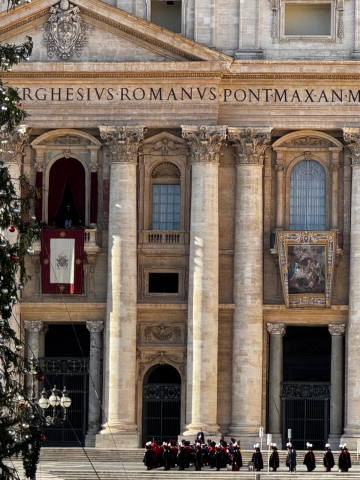
In his annual World Day of Peace message, Francis urges the forgiveness of international debt, the abolition of the death penalty, and the reallocation of military funds toward ending hunger.
The following article was published in the January - February 2025 issue of NewsNotes.
Every New Year’s Day since 1968, popes have issued a World Day of Peace message. This year, 2025, has the added distinction of being a Jubilee year, and in that spirit, Pope Francis’ latest message is titled “Forgive us our trespasses: grant us your peace.”
In his World Day of Peace message, Pope Francis reflects on the biblical roots of Jubilee as a time for seeking forgiveness and justice as the way to peace.
Francis begins by reflecting on the Jubilee year as a time for “listening to the plea of an endangered humanity.”
“The inhuman treatment meted out to migrants, environmental decay, the confusion willfully created by disinformation, the refusal to engage in any form of dialogue and the immense resources spent on the industry of war,” Francis writes, “represent a threat to the existence of humanity as a whole.“ In the Jubilee year, then, we are called “to break the bonds of injustice and to proclaim God’s justice. Sporadic acts of philanthropy are not enough. Cultural and structural changes are necessary, so that enduring change may come about.”
Reflecting on the phrase “forgive us our trespasses” – translated as “sins” in some languages, “debts” in others – Francis says it is when we lose sight of our relationship with God, who creates all things to be shared by all for the common good, that “we begin to cherish the illusion that our relationships with others can be governed by a logic of exploitation and oppression, where might makes right.” He points to foreign debt as emblematic of such exploitation.
Alluding to international relationships in which poorer countries provide raw materials to wealthier countries, and are unable to mitigate the ecological impact of such resource extraction as they service insurmountable debts, he says “Foreign debt and ecological debt are two sides of the same coin, namely the mindset of exploitation.”
Connecting economic and ecological justice to peace and nonviolence, Francis makes three concrete proposals for the Jubilee year.
First, he recalls and builds upon the Jubilee call of Pope John Paul II in 2000, to substantially reduce or cancel outright the “international debt which seriously threatens the future of many nations.”
In a press conference at the Vatican on Dec. 12, Cardinal Michael Czerny, SJ, Prefect for the Dicastery for Promoting Integral Human Development, noted that the Jubilee year marks merely the launch of what promises to be a longer campaign for structural change. Francis writes, “lest (debt forgiveness) prove merely an isolated act of charity that simply reboots the vicious cycle of financing and indebtedness, a new financial framework must be devised, leading to the creation of a global financial Charter based on solidarity and harmony between peoples.”
Second, asking for “a firm commitment to respect for the dignity of human life from conception to natural death,” Francis proposes “a concrete gesture that can help foster the culture of life, namely the elimination of the death penalty in all nations.”
Krisanne Vaillancourt Murphy, Executive Director of the Catholic Mobilizing Network (CMN), a U.S. organization working to end the death penalty, also participated in the press conference. She framed CMN’s abolition work within the nonviolent pursuit of restorative justice as a response to crime and violence. “No matter the harm someone has suffered or caused, we’re looking for healing; we’re not just looking for who can pay with a punitive price and exacting vengeance.”
Finally, Francis renews a proposal of Saint Paul VI and Pope Benedict XVI: “In this time marked by wars, let us use at least a fixed percentage of the money earmarked for armaments to establish a global Fund to eradicate hunger and facilitate… promoting sustainable development and combating climate change.” Just days after the pope’s message was released, the U.S. Congress passed an $895 billion Pentagon spending bill, even as speculation swirls around what government social programs may be cut under the incoming presidential administration.
Francis ends by noting that forgiving trespasses with the goal of peace requires disarming hearts – “hearts that see themselves as indebted to God and thus prepared to forgive the debts that oppress others; hearts that replace anxiety about the future with the hope that every individual can be a resource for the building of a better world… Lord, grant us your peace!”
Faith in action
Join the Catholic Mobilizing Network in working to end the death penalty in the United States. https://catholicsmobilizing.org/join/
Photo of Pope Francis on the balcony of St. Peter's Basilica for the Christmas Day address.
